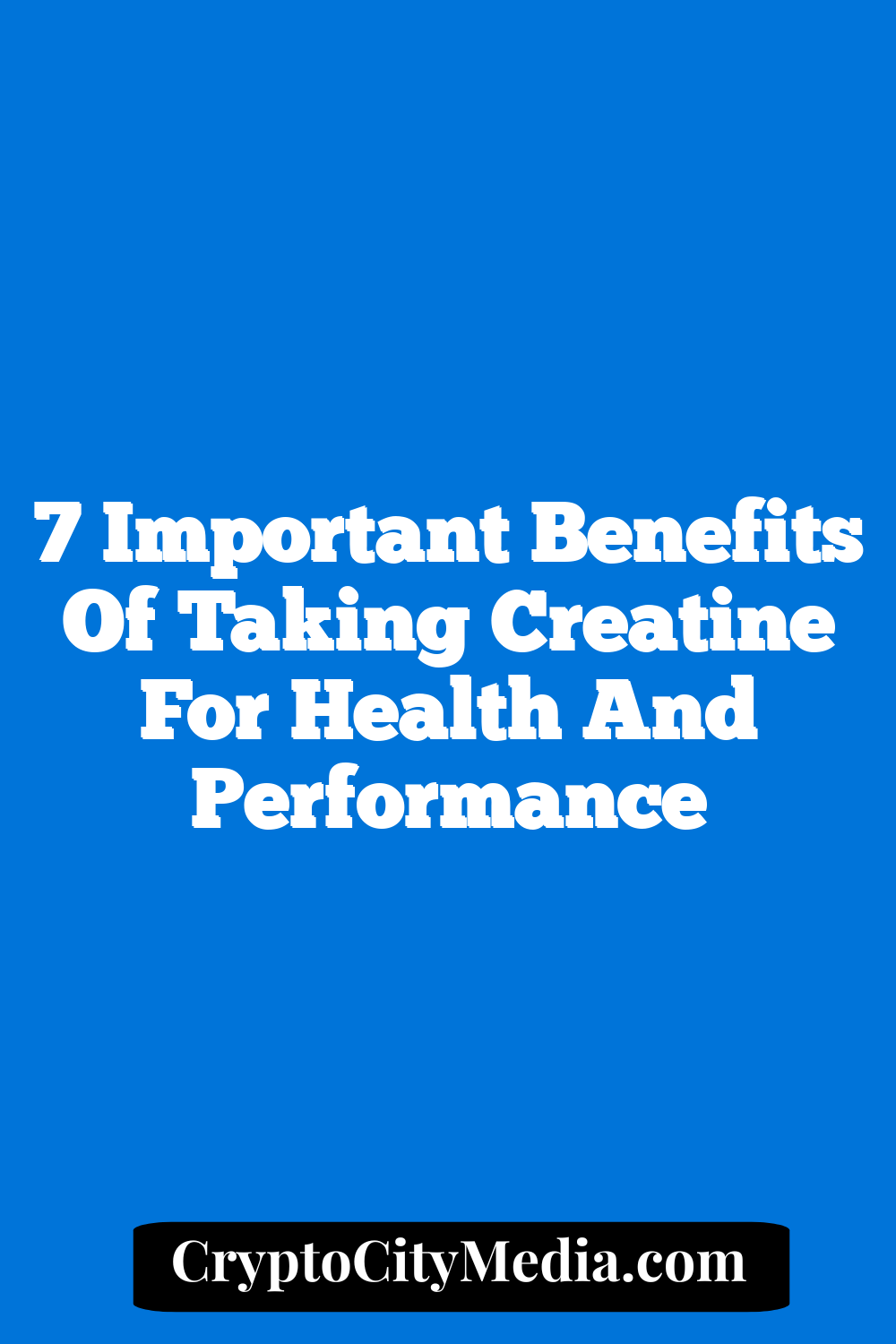
If you’re looking to enhance your workout performance or boost your muscle strength, you’ve probably heard of creatine. This popular supplement is known for its ability to improve short bursts of speed and power, making it a staple for athletes like sprinters and weight lifters. But its benefits aren’t limited to just physical performance.
Research shows that creatine not only helps generate the ATP needed for the first few seconds of high-intensity exercise but also aids in producing new ATP to keep you going longer. While it’s generally safe for most people when taken as directed, it’s crucial to consult your doctor before starting any supplement. Let’s dive into seven important benefits of taking creatine and how it might help you achieve your fitness and health goals.
Benefits of Creatine for Athletic Performance
Increases Muscle Strength and Endurance
Creatine supplementation directly ties to muscle strength and endurance gains. Studies show a significant increase in muscle mass when combined with resistance training. For instance, athletes observed substantial improvements in their back squats and bench presses after taking creatine consistently. The supplement helps delay the onset of fatigue, allowing for longer and more intense workout sessions. I started supplementing with Momentous Creatine after hearing Andrew Huberman mention he takes the brand on his podcast. You can use code ‘brainflow’ for 15% off your order!
Enhances Quick Energy Production
Creatine provides a rapid energy boost during high-intensity exercises. It acts by increasing the phosphocreatine stores in muscles, which aids in the quick regeneration of ATP (adenosine triphosphate). This is crucial for short bursts of explosive activity, such as sprinting or heavy lifting. Without needing a loading phase, those who take lower maintenance doses still achieve similar performance enhancements, making it a practical choice for athletes seeking immediate effects.
RELATED READING: Andrew Huberman’s Supplement List: The Complete Guide
Creatine and Muscle Recovery
Accelerates Muscle Repair Post-Exercise
Creatine supplementation can speed up muscle repair. Researchers found that creatine might enhance muscle force recovery after eccentric-induced muscle damage in healthy individuals. In a study published in the Journal of the International Society of Sports Nutrition, participants who took creatine supplements showed faster recovery rates. When physical inactivity strikes due to injury or chronic illness, such as arthritis, creatine may help prevent muscle loss. By promoting beneficial changes in muscle protein and cells, creatine offers a protective effect on muscles, aiding in their recovery and growth.
Reduces Muscle Damage and Soreness
Creatine can also reduce muscle damage and soreness. Multiple studies show that creatine supplementation during resistance training helps in minimizing acute strength loss induced by concurrent exercise. It’s effective in reducing markers of muscle damage, leading to less muscle soreness post-exercise. Research published in Sports Medicine has indicated that creatine might prevent muscle breakdown and support quicker recovery times between workouts. When combined with resistance training, creatine can provide substantial benefits in muscle preservation and reduced inflammation, making it a valuable supplement for athletes and active individuals.
RELATED READING: Harvard Scientist David Sinclair Reveals His Anti-Aging Supplement Stack
Creatine’s Impact on Brain Function
Supports Cognitive Processing and Memory
Creatine helps support cognitive processing by stabilizing brain energy levels. Stress can deplete these energy resources, impacting cognitive functions. Research indicates that supplementing with creatine may enhance short-term memory and intelligence tasks, especially in high-stress situations. For instance, a study found improvements in working memory and mental tasks among participants supplementing with creatine.
Potential Benefits in Neurodegenerative Disorders
Creatine’s role as an antioxidant provides potential benefits in neurodegenerative disorders. Oxidative stress and inflammation often accompany conditions like Parkinson’s and Huntington’s diseases. Given creatine’s antioxidant properties, it may help mitigate oxidative damage and neuronal death. Studies have shown that creatine supplementation can slow disease progression by maintaining energy levels and reducing oxidative stress in the brain. This makes it a promising adjunct therapy for managing neurodegenerative conditions.
Creatine for Weight Management
Assists in Muscle Mass Gain
By promoting muscle mass gain, creatine aids weight management. Increasing lean muscle mass enhances the body’s ability to burn calories, even at rest. Studies have shown that creatine supplementation, when combined with resistance training, leads to significant increases in muscle fiber size and strength. For instance, individuals taking creatine can experience an increase in fat-free mass by 2–4 pounds within four to six weeks. This increase in muscle mass can accelerate basal metabolic rate (BMR), thus contributing to weight management.
Potentially Improves Metabolic Rate
Creatine enhances cellular energy metabolism, supporting mitochondrial function, which plays a crucial role in energy production. Enhanced mitochondrial function improves overall energy supply, leading to increased energy expenditure. For individuals with metabolic syndrome, this boost in energy can reduce fatigue and promote physical activity, which is essential for weight management. Research indicates that creatine supplementation improves insulin sensitivity, enabling better glucose utilization for energy. Enhanced glucose metabolism can significantly reduce the risk of high blood sugar levels, commonly associated with diabetes and insulin resistance. Consequently, this improved metabolic efficiency aids in managing body weight and overall metabolic health.
By combining muscle mass gain and improved metabolic rate, creatine emerges as a valuable supplement for effective weight management.
Cardiovascular Health and Creatine
Possible Improvement in Heart Function
Creatine supplementation shows potential in improving heart function, particularly in ischemic conditions. Studies on rat hearts demonstrated that administration of phosphoenolpyruvate during reperfusion helped restore myocardial energy after ischemic damage. This indicates that creatine, through its involvement in energy metabolism, might aid in cardiac recovery. Researchers found that treatments incorporating creatine phosphate in cardioplegic solutions during ischemic events improved both metabolic and functional outcomes in heart tissues.
Reduction in Risk Factors for Heart Diseases
Creatine may help reduce risk factors associated with heart diseases by improving overall muscle performance. Enhanced muscle function can contribute to better cardiovascular health through increased physical activity and efficiency in energy utilization. Patients with chronic conditions such as Chronic Obstructive Pulmonary Disease (COPD) have shown improved exercise performance with creatine supplementation, according to a study published in Thorax in 2005. Increased physical activity levels, resulting from better muscle performance, correlate with lower cardiovascular risk factors, including reduced blood pressure and improved lipid profiles.
Creatine and Bone Health
Enhances Bone Regeneration
Creatine may support bone regeneration by improving muscle function and strength. Stronger muscles provide better support to bones, reducing the risk of injury and promoting quicker recovery. Enhanced muscle function can indirectly aid bone repair processes, making it an essential supplement for those recovering from bone injuries or surgery.
May Increase Bone Density
Research indicates that creatine supplementation could positively influence bone density, especially in older adults. Creatine, when paired with resistance training, can boost muscle mass, which in turn supports better bone health. This combination enhances skeletal strength, potentially mitigating the risk of osteoporosis and fractures, particularly among elderly women. Studies suggest that women, who naturally store less creatine than men, may benefit even more from supplementation during various life stages.
Creatine’s Role in Aging
Supports Overall Health in Older Adults
Creatine supplementation can significantly support overall health in older adults. Evidence shows that creatine enhances muscle strength and physical function, critical factors in maintaining mobility and reducing fall risk among the elderly. Creatine works by improving muscle mass and overall physical performance. Research also indicates that creatine supplementation can increase bone density, indirectly supporting bone health and reducing osteoporosis risks, especially in older women. This influence on muscle and bone health plays a vital role in the overall well-being of older adults, enabling a more active and independent lifestyle.
May Improve Quality of Life in Elderly
By supporting muscle strength and cognitive function, creatine may improve the quality of life in the elderly. Studies highlight creatine’s potential to enhance cognitive performance, particularly working memory and intelligence in older adults. Better cognitive health directly impacts life quality, enabling more autonomy and less dependency. Creatine also supports heart health by improving energy availability in heart tissues and reducing arrhythmias, contributing to better cardiovascular function. Healthier muscles, bones, and brains combine to enhance overall life quality for elderly individuals, who can experience increased vitality and reduced age-related complications.
Conclusion
Creatine offers a wide range of benefits that extend beyond just enhancing workout performance. From boosting muscle strength and repair to supporting brain function and heart health it’s clear that creatine is a valuable supplement for both young and older adults. Its positive impact on aging, including improved physical function and cognitive health, makes it a powerful ally in maintaining vitality and reducing age-related complications. By incorporating creatine into your routine you can enjoy these multifaceted benefits and support your overall well-being.




